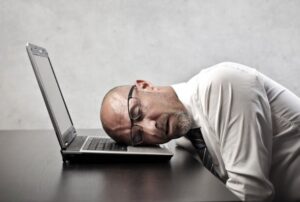Introduction
This post on insomnia is part of a Straight, No Chaser series on sleep disorders.
So the pendulum swings from hypersomnia to insomnia. Talking about insomnia makes me, well, tired. You know what the problem is. You either can’t fall asleep or you can’t stay asleep. You’re tired when you wake and throughout the day. Lack of sleep saps your energy and your productivity.
Insomnia really isn’t very cool to deal with, either as a person or as a physician. Patients are frustrated and sometimes cranky from being tired, or they can be extremely nervous and stressed, which will perpetuate a vicious cycle.
The Mental Factors of Insomnia
Unfortunately, there are many mental factors that can disrupt your ability to sleep. Medical professionals tend to think of insomnia in two forms for purposes of evaluation. Either the insomnia is the main problem (primary insomnia), or it’s secondary to another condition (secondary insomnia) such as reflux, uncontrolled asthma, arthritis or other pain syndromes. It could be due to medications, depression or just stress. It could be due to some undiagnosed condition, such as cancer, an enlarged prostate (making you have to get up to urinate throughout the night), thyroid disease or sleep apnea. Then there’s the caffeine (coffee/tea), nicotine (cigarettes) and drunk scene (alcohol).
The thing is, whether acute, intermittent or chronic, any type of insomnia really is an inconvenience and can even be incapacitating. Before you subject yourself to a million dollar medical workup, just remember: If it’s secondary insomnia, and you know (for example) that your pain is keeping you awake, try dealing with the primary issue. Alternatively, if it’s primary insomnia, there are a lot of things you might try.
Ten Tips presented in the order you might consider implementing them
- Adhere to good diet and exercise habits, which make your body perform as it should and which will clean up a lot of potential problems that will affect sleep.
- Avoid naps during the day. You want to be good, tired and ready to sleep when night comes.
- Develop the habit of only using your bed for sleep or sex. That conditions your body to be ready to sleep when confronted with the stimulus of your bed.
- Get your snoring partner some help if s/he is part of what keeps you awake. Check here for tips to deal with snoring.
- Try not to eat for several (3-4) hours before you sleep. Nothing says “no sleep” like heartburn all night. (By the way, this is the real reason you shouldn’t eat after a certain hour – not concerns about your weight.)
- Avoid nighttime stimulants (e.g., cigarettes, coffee, tea and exercise close to the time you want to sleep, if this proves to be a problem).
- Don’t drink and sleep. Although alcohol is a sedative, it’s also on the “don’t do” list, because it can cause restless sleep and interrupt the sleep cycle.
- Find a way to relax before sleep. Consider a bath, sex, a book or soothing music … or all of them.
- Set the alarm for the morning. Then hide your clock. You don’t need to have a clock to remind you that you aren’t sleeping all night.
- Use “white noise” for background if you’re bothered by other sounds.
Here’s a bonus tip: If you fell asleep during the reading of this post, keep it for future reference.
As Edward R. Murrow used to say (well before I was born): good night and good luck.
Follow us!
Ask your SMA expert consultant any questions you may have on this topic. Also, take the #72HoursChallenge, and join the community. Additionally, as a thank you, we’re offering you a complimentary 30-day membership at www.72hourslife.com. Just use the code #NoChaser, and yes, it’s ok if you share!
Order your copy of Dr. Sterling’s books There are 72 Hours in a Day: Using Efficiency to Better Enjoy Every Part of Your Life and The 72 Hours in a Day Workbook: The Journey to The 72 Hours Life in 72 Days at Amazon or at www.jeffreysterlingbooks.com. Another free benefit to our readers is introductory pricing with multiple orders and bundles!
Thanks for liking and following Straight, No Chaser! This public service provides a sample of http://www.SterlingMedicalAdvice.com (SMA) and 844-SMA-TALK. Likewise, please share our page with your friends on WordPress! Also like us on Facebook @ SterlingMedicalAdvice.com! Follow us on Twitter at @asksterlingmd.
Copyright ©2013- 2019 · Sterling Initiatives, LLC · Powered by WordPress
















